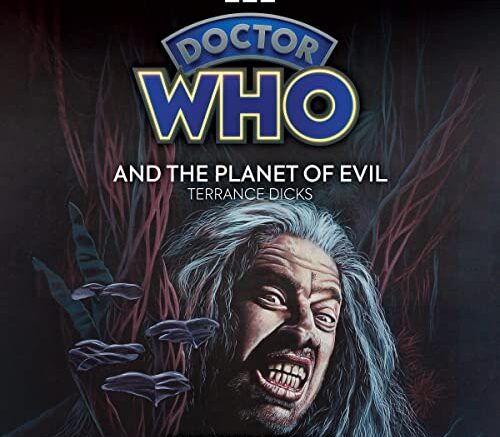Audio: Audiobook: BBC: Doctor Who.
Written by Terrance Dicks, and read by Tim Treloar.
The nature of Doctor Who is that some stories are constructed to be classics, and others are, with the best will in the world, just ways to get through four weeks of programming.
Then there are those middle-ground stories which have potential, but which never entirely nail the promise of their premise, and end up floating among the also-rans.
Planet of Evil is one of those middle-ground stories. It does have something to say, in terms of both scientific and military obsession, and how it can blind people to the good of all. And it does, also, have literary forebears – the idea of a man split between his rational and his animalistic self is straight out of Robert Louis Stevenson’s Strange Case of Dr Jekyll and Mr Hyde. Meanwhile, the idea of an expedition lost and regularly dying has the feel of Forbidden Planet.
There’s nothing remotely accidental about those similarities – Robert Holmes, Philip Hinchcliffe and Louis Marks discussed the idea of combining the two as the basis of the story.
Budget Issues
Unfortunately, when rendered on TV, the jungle setting of the nameless world on which the Morestran expedition finds itself was deeply unconvincing, and the “Antimatter Beast” – a largely formless and invisible thing outlined in vivid electric red lines – looked like a scientific experiment with visual techniques that never really went right.
In addition to which, the main “villain” of the piece, Dr Sorenson (Frederick Jaeger) looks permanently distracted beyond the call of the script, and there are episodes of back-and-forth that end up making what could have been a study of obsession and how close it takes us to “evil” into something to which the most usual response is a shrug.
Terrance Dicks, who novelised the story for the Target books range, was a somewhat quixotic writer. If he saw places to build up backstory, to deepen character, to paint the world in which the characters lived and worked, he would sometimes do that, and give you a book that was, as it were, “bigger on the inside” – bigger and more real than the televised version got the chance to be.
At other times, Dicks concentrated on simply rendering what was on screen in a faithful way, meaning the stories would live or die more or less within the remit of their original, on-screen versions.
With Planet of Evil, it’s fair to say, he erred on the side of faithfulness. With more time, more commitment and, probably fairly importantly, more money, there’s no doubt Terrance Dicks could have turned the novelization of Planet of Evil into a thing that fulfilled the potential of the original idea. But Dicks was frequently up against publishing deadlines, and had to deliver what was on screen first.
The Power of Audio
That’s the feeling that the novelization of Planet of Evil gives – a workaday translation of what appeared on screen, with slightly better effects because Dicks’ descriptions give you the scope to imagine them as something better than the 1970s Doctor Who budget would allow.
As such, is Planet of Evil worth a listen in its audiobook form?
Perhaps – but largely because of Tim Treloar on reading duties. Treloar, who in the world of audio Who is best known as the recast Third Doctor in Big Finish audios, is perhaps not the most natural choice to take on a Fourth Doctor story that mostly involves schlepping about an alien jungle, being attacked by Antimatter Beasts and squabbling about the mission parameters of scientific and military expeditions.
But Treloar gives it gusto, and if his Fourth Doctor is perhaps not as natural as his Third, by the end, you’re more than accustomed to it.
What he can’t really do – because the novelization fails to deliver on this – is make us care a whole lot about any of the people in the expedition, least of all Sorenson himself. Treloar works hard to make him complex, but the layering is not there in the book, lost underneath the important characterization of his as obsessive and self-possessed, so there’s only so much he can do.
With a running time of dead on three hours, it’s clear that Dicks was not especially disposed to give us much by way of background on the Morestran civilization – he sticks pretty close to the televised script, showing a society in desperate need of energy resources, and that gives a twinge of recognition in our age of resource-thirsty technology.
That said, the nuances of the Morestran plight were probably sharper when the story was broadcast in 1975, when the UK’s oil crisis would still have been in the minds of at least some of the audience. That sharpness has significantly worn off when coming to the audiobook version in 2023, which only emphasises the degree to which the story is four episodes of going back and forth on a jungle planet.
Is Planet of Evil worth buying? Bottom line, that depends on whether the story is a pre-existing favourite. If you’ve loved it over the years, then Treloar delivers you a version that will only add to your pleasure. If you’re not especially fussed about the story, the sad truth is that Terrance Dicks here sells you if not short – he was too much of a journeyman writer ever to do that – then certainly slim, filling his three hours with not that much of… well, of not that much.
Listening to Tim Treloar read anything for three hours will always be a pleasure, but ultimately, unless you’re a dedicated Planet of Evil fan, there are better ways to spend your money on top quality Treloar.



Be the first to comment on "Doctor Who and the Planet of Evil"